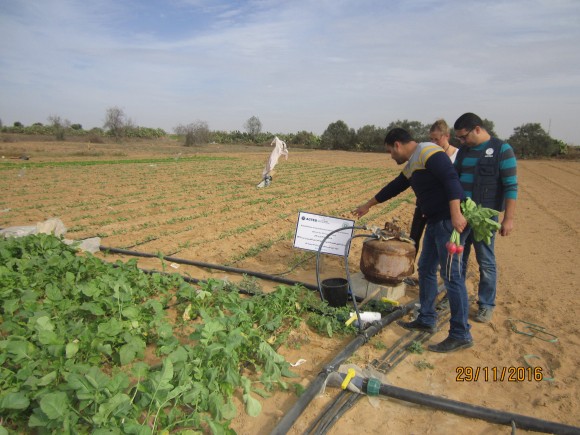Like in many places in the world, farming is a way of life in the southern Gaza Strip. However, the 2014 conflict has had a significant impact on agriculture in the area, severely limiting access to water, land and resources, and amplifying the already high levels of food insecurity.
Supporting agriculture in the southern Gaza Strip
Faced with such challenges, many hardworking farmers struggle to grow crops and yield only a small, if any, profit, despite all their constant efforts. Alia, a 65-year-old Palestinian farmer who heads a household of six people, was spending as much as 80% of her farming revenue on water and fertilizers alone, gaining very little reward for her hard work. Add to this the high cost of seeds and inadequate water infrastructure in the area, and it is no surprise that many farmers cannot afford or are unable to cultivate their own land. While the challenges farmers face in Gaza are not always the most apparent, they impact the food security of the wider area.

With help from the local community, ACTED and the Arab Center for Agricultural Development (ACAD) came together in 2016 as part of a project funded by UNOCHA to improve water access and restore the livelihoods of farmers in the southern Gaza Strip. Through the installation of 26 water ponds and the repair of 15 kilometers of damaged irrigation lines, 502 dunums (50 hectares) of land are now once again being cultivated by farmers as a direct result, both improving their livelihood and income opportunities and strengthening the area’s food security. With the improved access, Alia’s water costs have now halved, allowing her to cultivate two more dunums of land with her savings. Like Alia, 656 other farmers have benefited from this project.
Mobilising community for sustainable impact
To ensure the project’s long term impact, highly respected community members formed maintenance committees to support the other farmers in the area. They were trained by ACTED and ACAD to identify and report any future issue with the rehabilitated infrastructures. They also work together on the prevention of risks associated with explosive remnants of war. Overall, it was a massive community effort to collectively improve the farming industry, and therefore food security, in the area.